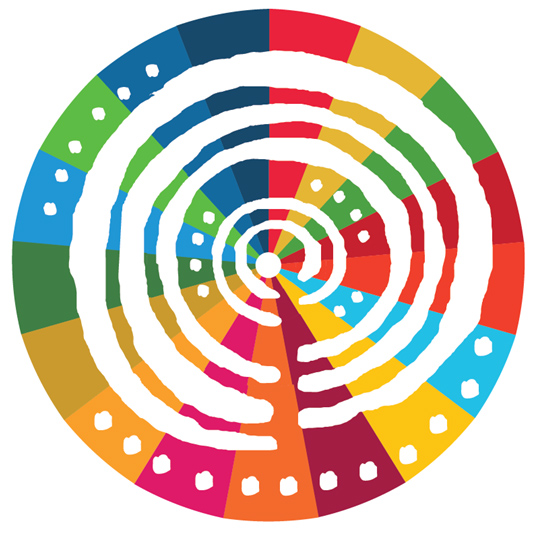2030 Agenda and Sustainable Development Goals: Uncertain Compliance Scenario for Latin America and the Caribbean
Work area(s)
A mixed balance emerges for the region following this week’s UN 2019 High-Level Political Forum in New York, where ECLAC participated actively in various sessions.
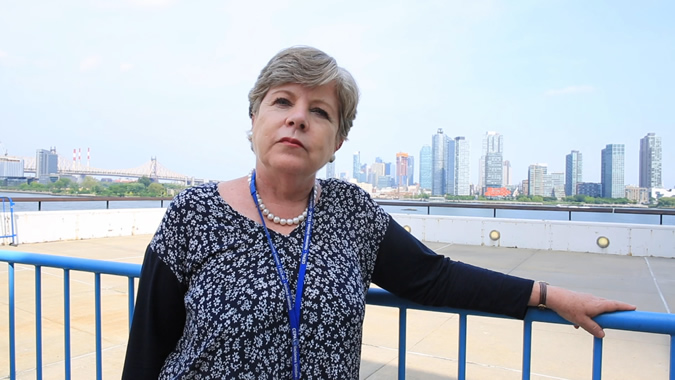
The High-Level Political Forum on Sustainable Development – the principal global meeting for examining the commitments assumed by countries in order to meet the 2030 Agenda and its Sustainable Development Goals (SDGs) – closed its 2019 session with a mixed balance for Latin America and the Caribbean. The region was represented at this year’s Forum by Chile, Guatemala, Guyana and Saint Lucia, countries that presented their national progress reports to the world assembly.
By delivering their Voluntary National Reviews (VNR), these countries are a reflection of the notable political commitment of the region to the 2030 Agenda four years after its adoption: Latin America and the Caribbean have already presented 22 reports in the 2016-2018 biennium, in addition to the four mentioned, some for the second time (Chile and Guatemala).
The United Nations Economic Commission for Latin America and the Caribbean (ECLAC) has closely accompanied its member States in this process. In this context, Executive Secretary Alicia Bárcena participated actively in New York in various sessions and side events to the UN High-Level Political Forum (HLPF), which took place July 9-19. She expressed her permanent support for the countries and underscored the pending challenges for full compliance with the Agenda in the region.
“Our balance is mixed. Many countries of the region have committed to the 2030 Agenda, created inclusive instances and special institutions for its follow-up –around 29 of a total 33 countries have already set up some inter-sectorial framework – and they have also created special public budgets to undertake this compliance, particularly when it comes to public social spending,” said Alicia Bárcena in her remarks on the general balance at the closing of the forum.
“However, we are very concerned about follow-up and the balance, because our region is growing less, while inequality and poverty are on the rise. Therefore, on one hand, it is a region that has made a lot of effort in the past to reduce poverty and inequality, but since 2015 approximately, these have begun to increase,” asserted the United Nations high official.
Bárcena explained that this reality produces various scenarios. First, there are some SDGs that will be met by 2030, like the reduction of child mortality. Second, there is a set of indicators that are trending in the right direction, such as access to internet. Third, there may be some that will not be met at all, such as the case of clean, healthy water.
“If the region does not grow and inequality doesn’t diminish, it will be hard for us to meet those goals,” she emphasized.
In her capacity as coordinator of the five regional UN commissions – the Economic and Social Commission for Asia and the Pacific (ESCAP); the Economic Commission for Africa (ECA); the Economic Commission for Europe (ECE); the Economic and Social Commission for Western Asia (ESCWA); and ECLAC – Alicia Bárcena stressed that since the adoption of the 2030 Agenda, these five commissions have provided their Member States with platforms centered on the SDGs for debate, regional forums for peer learning and capacity building. She added that the 2030 Agenda recognizes that regional action is essential for ensuring progress on the SDGs and underlines that the regional level helps to contextualize the global goals and translate them into national sustainable development realities.
At the end of this HLPF, Alicia Bárcena also concluded her role as coordinator of the UN regional commissions; the responsibility will now fall to the Executive Secretary of the Economic Commission for Africa, Vera Songwe.
In the case of Latin America and the Caribbean, ECLAC has already organized three meetings of its regional forum, the Forum of the Countries of Latin American and the Caribbean on Sustainable Development, which last met in April in Santiago, Chile, in preparation for the world event held over the last two weeks in New York. Her conclusions are contained in the Quadrennial Report on progress and regional challenges in relation to the 2030 Agenda for Sustainable Development in Latin America and the Caribbean, which ECLAC prepared jointly for the first time in April with the regional offices of UN agencies, funds and programs.
“These forums have been fundamental spaces, because they are where countries do test presentations of their voluntary reports, but they are also a place for peer analysis and generate lessons learned among them, as well as opportunities for South-South cooperation to see which countries can support others on certain issues: statistics, planning, among others,” indicated Bárcena.
“In this particular High-Level Forum is the first time much more explicit acknowledgement has been made of the regional dimension. We had a session with all the presidents of the regional sustainable development forums, in our case represented by Cuba’s Minister of Foreign Trade and Foreign Investment, Rodrigo Malmierca, who presented a report on our forum,” she said.
The next (fourth) Regional Forum of the Countries of Latin America and the Caribbean on Sustainable Development, which will continue with the review of actions to comply with the 2030 Agenda in the region, is scheduled for April 2020 in Havana, Cuba, the country that currently holds the presidency pro tempore of ECLAC.
Alicia Bárcena likewise underscored the opportunity that the HLPF presented for hearing representatives from other regions, and thus learn about the realities of Africa, the Middle East and Asia Pacific, and in this way share experiences with Latin America and the Caribbean in order to contribute the best from everywhere to the global effort.
“The 2030 Agenda is complex and the support the United Nations Member States requires to meet its goals must be integrated, coordinated and multilevel,” she stated on Wednesday, July 17 at a side event to the HLPF. Said event was attended by government representatives and resident coordinators of the UN system, who analyzed how the world organization can support the nations of Latin America and the Caribbean on its path toward sustainable development for all.
In her remarks at the HLPF 2019, the ECLAC Executive Secretary underscored the importance of local contributions when it comes to achieving the SDGs, as well as the inter-relationship between national, regional and local action for their implementation. She also highlighted the importance of dialogue between the public and private sectors and all stakeholders involved, in order to meet the SDGs.
During the week of the High-Level Political Forum in New York, ECLAC was also the host of a meeting on the importance of the Escazú Agreement on rights of access to information, public participation and justice in environmental matters, for Latin America and Caribbean. On behalf of Alicia Bárcena, the Director of ECLAC’s Subregional Headquarters for the Caribbean, Diane Quarless, said that over the last decade, ECLAC has put equality at the center of development, as a non-negotiable ethical principle from a rights perspective. “The reduction of inequality is not just an ethical imperative, it is a requirement for the effectiveness and efficiency needed to attain sustainable development and ensure that no one is left behind. Inequality is a barrier to development,” she said.
The Agreement has currently been signed by 17 countries and was ratified by Guyana on April 18, 2019 (the first country to do so). Saint Vincent and the Grenadines was the last nation to sign the treaty at United Nations Headquarters this past Friday, July 12.
Related content
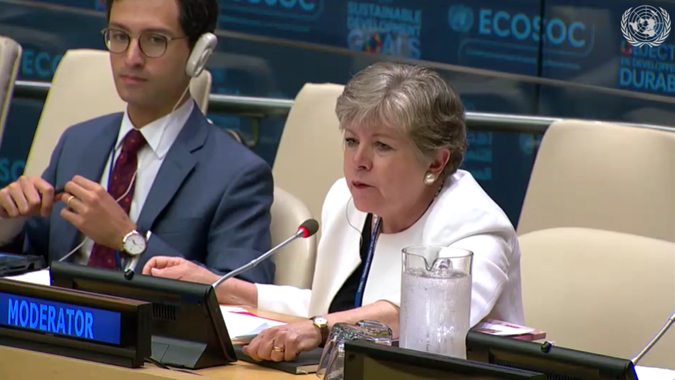
Alicia Bárcena: “Active fiscal policies are needed to finance the 2030 Agenda and ensure that no one is left behind”
On the first day of the High-Level Political Forum on Sustainable Development 2019, ECLAC’s Executive Secretary, speaking on behalf of the five United Nations regional commissions, gave an account of…
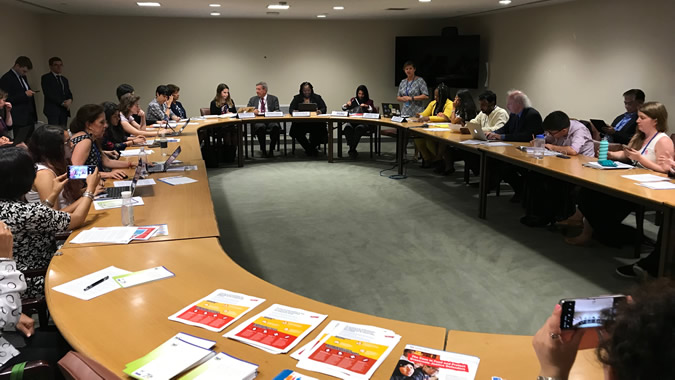
Ensuring Environmental Rights of the Most Vulnerable is Fundamental to Combating Inequality and Achieving Sustainable Development
During a side-event to the 2019 United Nations High-Level Political Forum, experts reaffirm the importance of the Escazú Agreement for Latin America and the Caribbean.
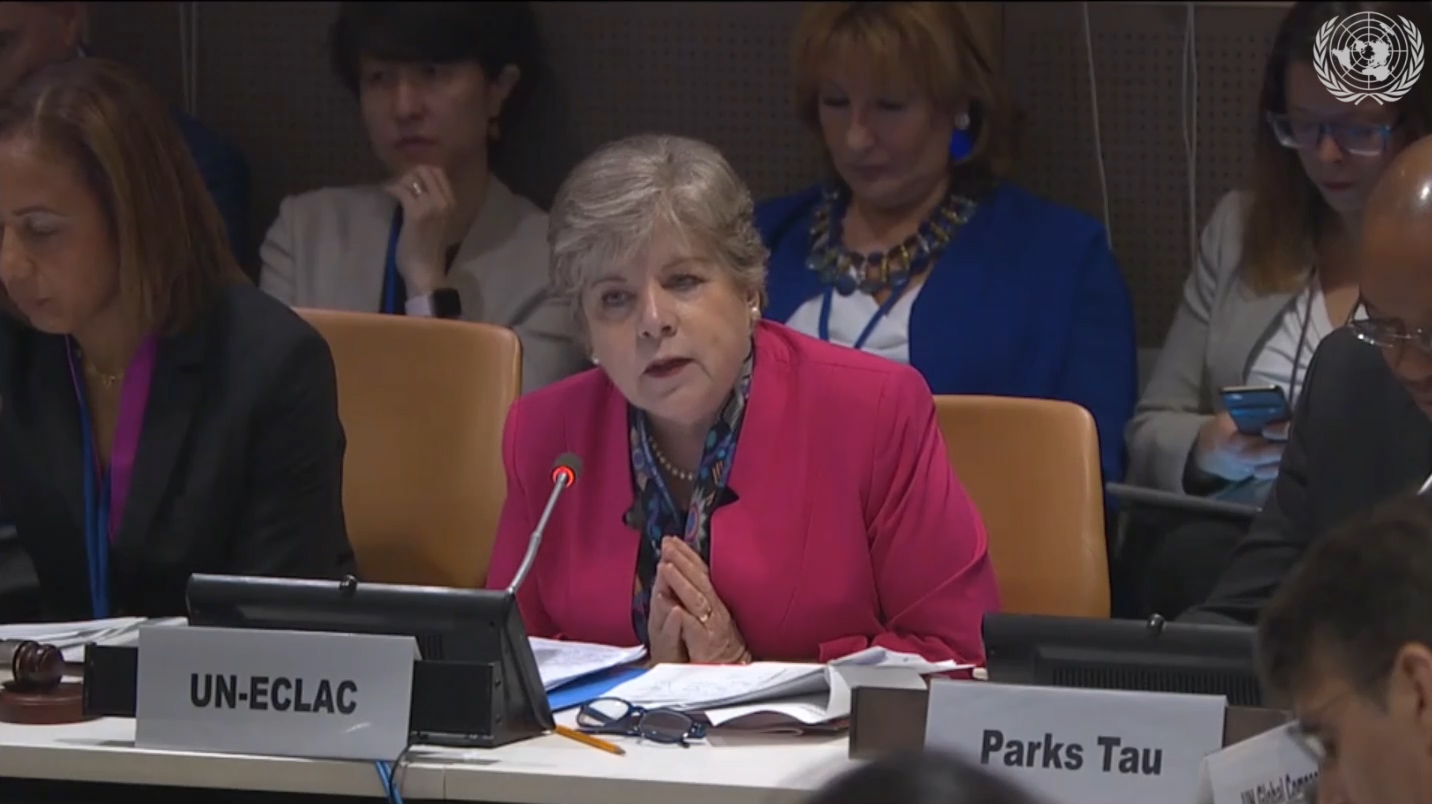
Alicia Bárcena: Addressing Inequality at the Local Level is Essential to Achieving Sustainable Development
In the context of the 2019 High-Level Political Forum on Sustainable Development, ECLAC’s Executive Secretary took part in different sessions in which she addressed the importance of local action,…
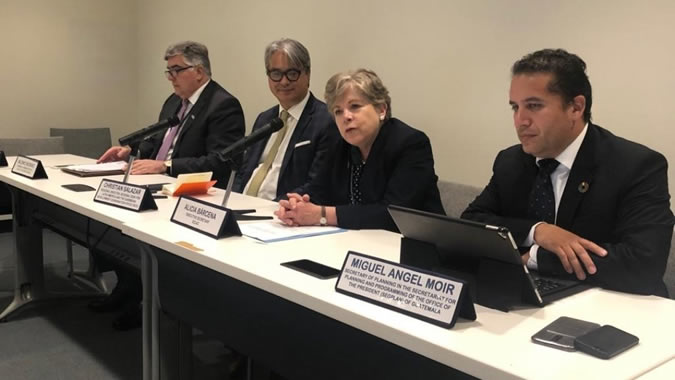
States Require Integrated, Coordinated, Multilevel Support to Meet the 2030 Agenda
ECLAC’s Executive Secretary, Alicia Bárcena, led a meeting with representatives of Chile, Guatemala and Guyana on how the UN system can support countries on their path toward sustainable development.
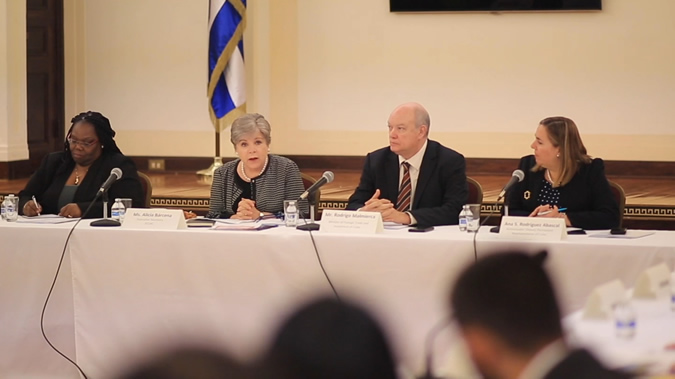
Regional Forum on Sustainable Development is a Space of Political Consensus among the Countries of Latin America and the Caribbean
ECLAC Executive Secretary Alicia Bárcena met in New York with representatives of countries from the region to report the results of the last meeting of the Forum and announce preparations for the…
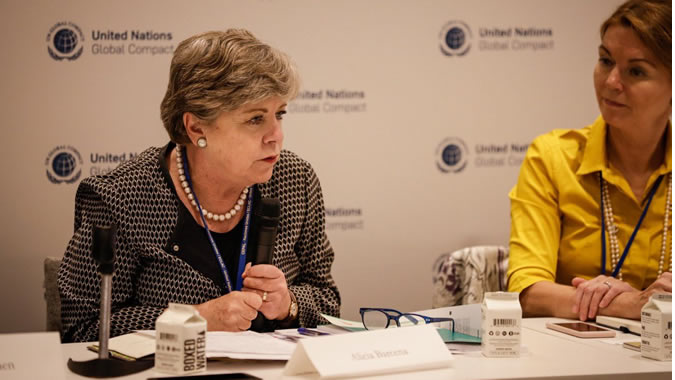
Alicia Bárcena: The Conversation Must Change between Governments, the Private Sector and Civil Society to Meet the SDGs
ECLAC’s Executive Secretary took part in an event organized by the UN Global Compact and the permanent missions of Argentina and Lebanon on the sidelines of the High-Level Political Forum on…
Related link(s)
Country(ies)
- Latin America and the Caribbean
Contact
Public Information Unit
- prensa@cepal.org
- (56 2) 2210 2040
